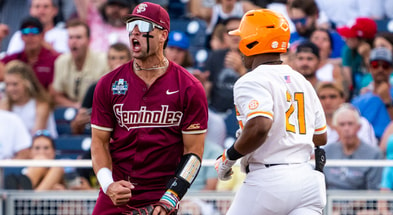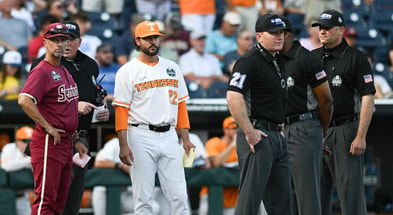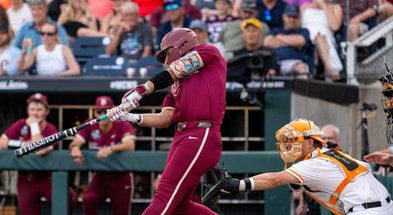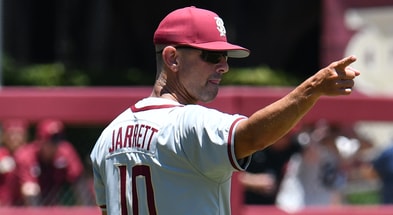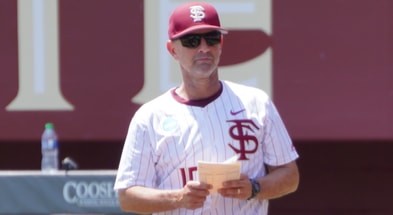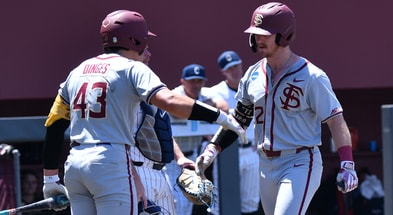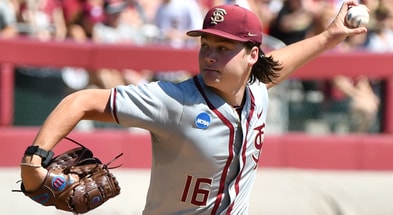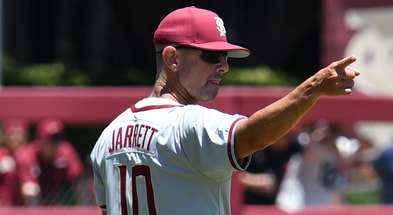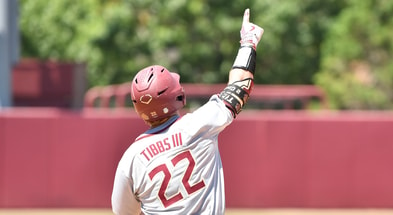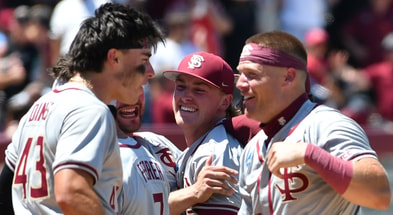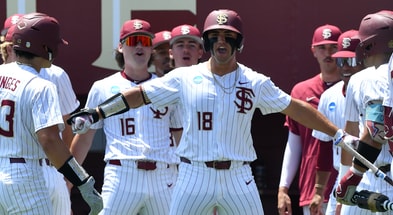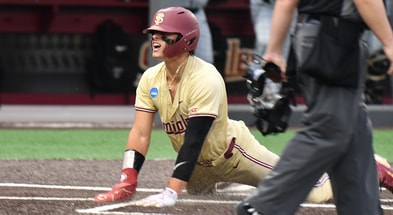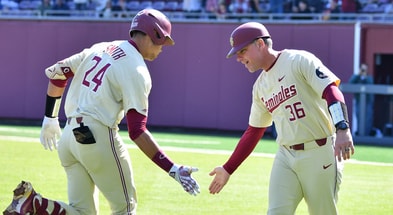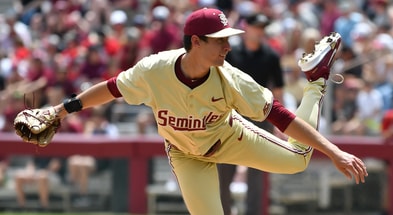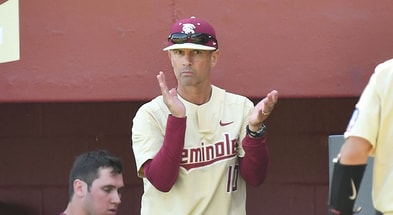How mental toughness and intentional training have given Florida State Softball's Team 40 its edge
The very first meeting of Team 40 was spent watching the demise of Team 39.
Reliving every moment. Remembering the disappointment. Tasting the tears.
The 39th team in Florida State softball history ran roughshod through the 2022 regular season and the ACC Tournament. The Seminoles were expected to do the same in the NCAA regional and super regional rounds, too, and advance to the Women’s College World Series for the fifth time in eight seasons.
They were ranked No. 2 in the country. Their record after run-rule drubbings of Howard and USF in the opening rounds of the Tallahassee Regional was a sparkling 54-5. They hadn’t lost a game in over a month.
Then the unthinkable happened.
Back-to-back losses to Mississippi State in the championship round. A 5-0 sleeper in which the Seminoles recorded just two hits. Then a stunning 4-3 defeat that saw an early FSU lead evaporate in an instant.
Just like that, the season was over.
In her postgame press conference, Florida State coach Lonni Alameda directed all of the credit to Mississippi State. She said her Seminoles gave everything they had, and she emphasized that one tough day at the park shouldn’t diminish a “historic” season.
“It’s more about today was Mississippi State’s day; nothing went for us,” Alameda said. “Tip your hat to them and wish them luck as they move forward.”
But deep down, either in that moment or later upon deep reflection, Alameda realized that wasn’t entirely true.
While her powerful Florida State team was racking up victory after victory during that 2022 season, the veteran head coach wasn’t always in love with how the Seminoles were performing.
“I think we won a lot of games, but maybe in not the right fashion,” Alameda recalled recently during an interview with Warchant. “But we rode out the win and just said, ‘Good job, we won!'”
That is absolutely not how Team 40 operates.
Not in the slightest.
There is accountability after every game — win, lose or draw. The Seminoles hold, “Tell the truth Mondays,” where players, coaches and staff members can air anything they’re not happy about.
After a midweek shutout victory for the Seminoles last month, Alameda couldn’t wait to get back in the meeting room with her players the next afternoon.
“I didn’t really like the way we won that game,” she said before addressing the team.
Then she delivered that message to Team 40 in no uncertain terms.
“We need to win our process,” she said. “And not always be about the ‘W.'”
‘Shared adversity’ and The Program
Kathryn Sandercock had heard the ominous stories. About the grueling physical challenges. How the course instructors would push you to the brink mentally, barking orders and demanding perfection. How in some of the previous water training exercises, Florida State softball players had struggled just to keep their heads above water.
Sandercock never really got worried, though, until the team’s bus started weaving through the darkness, up into the mountains, and veteran pitcher Meghan King stood up to try to reassure Sandercock and the other first-year players.
“Don’t worry,” King said. “They’re not gonna let you die.”
Not gonna let you die?
If King’s goal was providing comfort to her younger teammates, the mission failed.
“I was like, ‘What are we getting ourselves into?'” Sandercock recalled. “I was super nervous.”
That was her welcome to The Program.
As Lonni Alameda steamrolls through her 20th season as a head college softball coach — the last 15 at the helm of Florida State’s powerhouse program — she is always looking to find edges for the Seminoles. She adopts cutting-edge techniques and new-age strategies. She is aggressive when it comes to bringing in talented transfers. She has made numerous tweaks to her coaching and support staff.
But one consistent for Alameda’s Seminoles in recent years has been starting each campaign with The Program — a team-building and leadership regimen that was devised by, and is led by, military veterans and elite athletes.
Hundreds of teams around the country have taken part in The Program since its inception in 2008, and Florida State Softball is one of many that brings the group back every year. It is such an integral part of the Seminoles’ culture, in Alameda’s eyes, that she had the training moved back this year to January because she wanted to make sure Texas A&M transfer Katie Dack could take part after enrolling for the spring semester.
The Program offers a variety of venues for the initial two-day “Judgment Day” training. The one Sandercock took part in as a freshman was “Wilderness Leadership.” This year, the Seminoles went to the beach and participated in “Small Boat” exercises, where they competed together in a variety of land and sea drills.
“You’re building team cohesion through shared adversity,” Alameda said.
The two-day mission actually begins with a phone call to one of the players in the middle of the night, before they depart. The chosen player is instructed that 25 items need to be gathered and taken on the trip; it is the team’s required “gear list.”
It typically includes basic items such as toothbrushes and toothpaste, but random objects such as a red T-shirt will be included. The player who receives the call has to hear the instructions correctly, write down an accurate list and then communicate it clearly to every other player on the team. Then when the squad arrives at the training site the next morning, they are required to have their entire gear list in order.
It’s a test to see how well players receive directions, share information with teammates and execute plans under duress.
“This is the first year we passed the first test,” Alameda said with a smile. “And we’ve been doing it a long time.”
Team 40 nearly aced the next part of this year’s Program training as well — it’s called 16 perfect minutes, and it features players lining up in precise rows and columns and running through a battery of calisthenics. If one player makes a mistake, the entire team has to start over. And that continues until the team finishes the entire 16-minute workout without one miscue.
It’s a process that has taken some teams three hours or more to complete.
“It can take a long time if you keep messing up,” Sandercock said. “Last year, it took us over an hour.”
This year, the Seminoles had only one tiny slip-up. Then they nailed it.
“We did pretty good,” Sandercock said.
From there, the training grew more arduous.
The players were tasked with using foot pumps to blow up inflatable rafts within a six-minute time limit. Then, using one paddle apiece and working in teams of four or five, they had to race out to a buoy in the ocean, conduct several maneuvers in the water, then race back to shore and make sure all the boats were lined up meticulously.
Once they returned to the beach, the players were then instructed to dig two large holes in the sand — each of a particular size and a specific distance apart. And the team received only two small shovels for 20-plus players.
“One of the tricks we learned was don’t use your hands,” Sandercock said, bragging that Team 40 reached out to some former FSU players — who had been on the boat excursion in the past — and were told to grab pots and pans from inside the beach house to dig faster. They did that, and it definitely helped.
But that doesn’t mean it was easy. After the sun went down and the January temperature dropped considerably, the players soon realized they had dug their holes too close to the water. And when the tide rose, the water began to wipe out their holes.
“So we had to fill those holes in and move back up the beach,” Sandercock said. “Then we have to dig two more holes, and we’re all exhausted and feel dehydrated. It’s just terrible. But it’s in this moment where we’re all just together. And I think that it really does correlate — when you’re in the seventh inning and you’re up one run or down one run, whatever it is. And you have those moments where you eye up your teammates and you’re like, ‘We’ve been here before. We’ve been under pressure before. We’ve been through adversity before.'”
As if the players needed any more adversity, The Program’s trainers were happy to provide a little more.
At night, half the team was instructed to go sleep inside the beach house while the other half slept outside in tents. To combat the cold weather, the players had to take turns tending to the fire. And every two hours, the players were told to wake up and rotate from house to tents and vice versa.
Oh, and remember those paddles the players used during their boat drills? Each player was required to keep hers by her side for the entire two days. If a paddle was ever left outside of arm’s reach, the drill instructors could confiscate them, and then the players had to perform specific exercises to earn them back.
“They are trying to push you to extremes,” Alameda said.
*** Sign up for premium access to Warchant.com and the On3 Network for only $29.99. ***
‘Nothing happens by chance’
As she reflected on last season’s disappointing finish for Team 39, Lonni Alameda knew she couldn’t just chalk it up to a good day for Mississippi State and some tough breaks for the Seminoles. She had to learn from it, and also help her players grow.
Perhaps the biggest change she implemented during the offseason was hiring former Florida State star Ellie Cooper as the Seminoles’ first Player Performance Director.
Alameda could have cast a wide net to fill the position, but there was no sense in that. She was looking for a current mental performance coach, one who would understand Florida State’s culture and also be able to relate well to the players.
No one could have fit the bill better than Cooper, a former FSU team captain who earned All-ACC honors twice and was a student assistant coach in 2018, when the Seminoles won their first national championship.
“She checks so many boxes,” Alameda said.
Cooper didn’t necessarily plan to specialize in mental performance when she finished her Florida State playing days in 2017. But looking back now, she sees why it’s a natural fit.
Many of the traits and characteristics she helps Florida State players develop were things that made her special as a player — first as a Seminole and then as a team captain for the New Zealand national team.
“It was kind of what made me who I was,” Cooper said.
After coaching at East Carolina for two years and then pivoting to focus on the mental aspect of the game, studying under highly acclaimed performance coach Brian Cain, Cooper spent time working with numerous college and high school sports teams and was steadily building her clientele. But when the call came from Alameda, her former head coach, Cooper didn’t need to be sold.
“I would argue the culture development in this program is second to none — compared to, honestly, any sports program in the country,” she said.
While Alameda and her coaching staff are focused on skill development and strategy and all of the other things that go into leading one of the nation’s elite softball programs, what Cooper does is help sharpen the players’ mental approach and work with them to harness their leadership skills.
Sometimes that means helping players understand how to create winning habits, which can alleviate undue stress and provide confidence in challenging situations. Other times, it’s teaching them how to block out the negative impulses that can emanate through social media and other outside influences.
Alameda believes college athletes have always needed help in these areas, but the necessity is greater than ever because of the challenges facing members of this particular generation, “Gen-Z,” who are often already battling feelings of loneliness and isolation. And in Alameda’s mind, the issues in team sports are compounded by the fact that so many elite athletes now grow up in a travel ball environment, where their teams don’t have to endure the highs and lows of a typical sports season. They instead travel from town to town every weekend and compete for medals upon medals.
If a weekend goes poorly, the players can simply flush that failure and attain success one week later. The idea of working together to overcome shared adversity can be a foreign concept.
“I think now we’re so identified on building our skill sets that we lose teammate-ability,” Alameda said, adding that the after-effects of the COVID pandemic have only magnified those issues. “It can become a very isolated, very alone group.”
These challenges are not unique to Florida State, of course. But Alameda and her staff believe it’s their job to help the Seminoles’ players navigate those waters as well as possible. Not simply because it will benefit the team performance, but because it’s in the best interests of the young women.
“There’s a lot on their plate, and all they want to do is perform well,” Cooper said, adding that social media and Name, Image and Likeness opportunities can add to the challenges. “They want to perform well for themselves, but also for their families, for their teammates, for their coaches. And to help themselves build a brand.”
That can lead to an awful lot of pressure.
To help the Seminoles overcome those obstacles, Cooper says her mission is to provide the players with as many tools as possible, and then help them sharpen those tools just like they would catching, throwing, hitting or pitching.
It is a constant battle, and one that Cooper fights with deep conversations, quick lighthearted comments, visual reminders and whatever else she can come up with. Anything to help Florida State’s players perform their best during the most routine plays and also during game-deciding moments.
“You sync to the level of your training and habits,” Cooper said. “So when people say, ‘Oh, she’s really clutch.’ ‘No, she’s trained really well. She’s trained her skills to handle whatever is in front of her face.'”
For a Florida State team that finished the regular season last weekend with a 47-8 record and a 22-2 mark in the Atlantic Coast Conference — running away with the Seminoles’ 14th regular-season ACC title and first since 2019 — there have been many opportunities to demonstrate that mental toughness.
This past weekend’s series sweep of Louisville was a perfect example.
In Friday’s victory, the Seminoles were clinging to a 6-4 lead when Louisville loaded the bases with two outs in the seventh inning and brought the nation’s home-run leader, Taylor Roby (22 HRs, 55 RBIs), to the plate. Sandercock, who started the game and pitched the first five innings, came back in and struck Roby out on four pitches.
In Saturday’s win, Florida State fell into an early 4-0 hole before battling back to send the game to extra innings. Then in the 11th, junior second baseman Devyn Flaherty smashed a two-run home run — her first homer of the year — to lift the Seminoles to another 6-4 win.
Then on Sunday, Sandercock again shut the door on the Cardinals to secure a 2-1 victory and series sweep. It was the Seminoles’ 13th straight win, and Sandercock was credited with all three wins on the mound to improve to 21-3 on the season.
On Wednesday, she was named ACC Pitcher of the Year, while Alameda was named ACC Coach of the Year.
“She is the mental performance golden star to me right now,” Cooper said of Sandercock, explaining that everything the senior does in practices and workouts is designed to help her perform at the highest level when the Seminoles need her most.
“In those big moments, she falls back on her training and habits: ‘How can I win this pitch? How can I get my job done in this moment?’ The kids who have things to go to when they need something to go to in those big moments, they’re the ones who give themselves the best chance to get the job done,” Cooper said. “You’re not always going to get the job done. But you’re going to give yourself the best chance to do it.
“Nothing happens by chance. It happens by intention.”
And when something doesn’t go Sandercock’s or the Seminoles’ way, like when they dropped a series earlier this year at No. 3 Oklahoma State and then lost a heartbreaker to No. 1 Oklahoma, the players have immediately turned their attention back to the process. Not focusing on what their opponents did well, but examining how they could have performed better.
In separate conversations, Alameda and Cooper both said they want Florida State’s players to see every adverse situation — and every failure — as an opportunity to add armor and grittiness that will serve them well in the future.
Said Alameda: “I love that they embrace that part of it.”
‘Tough as shit’
Ellie Cooper laughs when asked about the socks.
They are bright and yellow and long, with green writing. They feature an image of a young lady sitting peacefully next to a flower. They bear a simple message:
“Turns out, I’m tough as shit.”
Cooper saw the socks one day this spring while walking past a vendor on Florida State’s campus and knew they would be a perfect visual aid for Team 40. And after every weekend series since then, the “golden socks” have been awarded to the Florida State player who demonstrated the most toughness in those games.
As one might imagine, the socks are highly coveted.
When Sandercock received them earlier this year after a series win at No. 15 Duke, she proudly wore them over her sweatpants on the way home. Then when the Seminoles went on the road in early April and swept No. 4 Clemson — in front of capacity crowds of nearly 2,000 fans at each game — the socks were presented to the entire team.
Not just because it was a huge ACC series victory against a team that was higher-ranked at the time, but because of everything surrounding the games.
The fans and opposing players were chippy. There were numerous stops and starts due to weather delays. And it marked the first time an FSU team had ever won three straight games against a top-five opponent in the regular season.
“You don’t sweep the No. 4 team in the country if you don’t have 22 tough individuals, getting after it together,” Cooper said. “I thought, ‘We are leaving Clemson a tougher team.’ So the whole team got the socks.”
The entire team could not wear them, of course. So as a symbolic gesture that week, the Seminoles tied the socks around the paddle that they took home from The Program’s Judgment Day training in January.
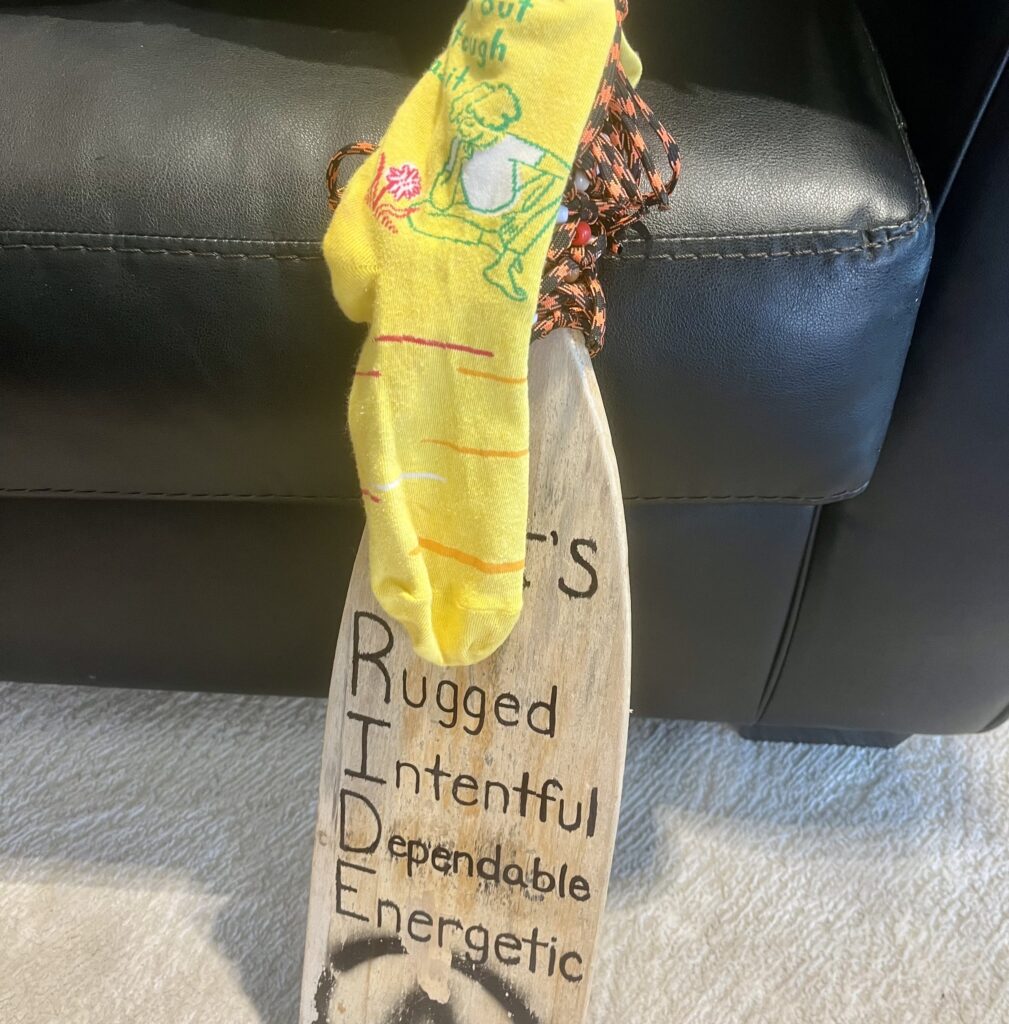
Florida State’s theme for this season, “Let’s Ride,” is written on the paddle in large black letters — with RIDE serving as an acronym for, “Rugged, intentful, dependable, energetic.” Bracelets that the players made that weekend are wrapped around the paddle as well. And the score of every game has been etched on it as the season progresses.
“It represents power and direction,” Alameda said of the paddle, explaining that one person can’t do all the rowing or a boat will spin in circles. “If we’re all able to do our job, handle our paddle and be in unison, then we’ll be able to row our boat where we want to go, which is Oklahoma City.”
Team 39 did not make it to Oklahoma City for the Women’s College World Series. And there is no guarantee that Team 40 will either. Lonni Alameda knows that as well as anyone.
Sports are sports. Round balls and round bats can yield unexpected results. Great teams can get upset.
What Alameda, Cooper and the entire Florida State staff and roster are working for — what they’ve been working toward since that grueling weekend at the beach four months ago — is making sure they do everything in their power to give themselves the best possible chance for success.
A chance to win it all like the Florida State softball team did in 2018, or to make the championship finals like the Seminoles did in 2021.
It’s why they take The Program so seriously. Why they encourage each other to be brutally honest on, “Tell the truth Mondays.” Why they added Cooper — with her silly socks and her heart-to-heart talks — to the staff this past offseason.
“If we get beat, it’s going to be because we got beat,” Alameda said. “If we get beat because we are internal? Ugh …”
She didn’t finish the thought.
She probably doesn’t want to even contemplate it.
What Alameda does know is there will be moments of adversity during Team 40’s postseason journey, which begins this week with the ACC Tournament at Notre Dame, Ind., and continues with a home NCAA regional tournament next week. (No. 1 seed FSU opens ACC play Thursday morning against Syracuse at 11 a.m. on ACC Network.)
There almost certainly will be bad bounces and missed calls. Tough moments and rough stretches. Hot and humid weather. Doubleheaders caused by rain delays. Maybe even games played well late into the night.
It’s postseason college softball. It comes with the territory.
And Alameda believes all of those situations, if her team has prepared correctly, will only serve as opportunities for Team 40 to prove how far it has come. To show its mental and physical toughness.
“Things don’t have to be going right for us to be successful,” Florida State’s head coach said.
That lesson was on full display in their biggest test to date — that series at Clemson.
“We had been building for that all year long,” Cooper said. “We are battle-tested. We’ve put ourselves in tough environments. We’ve responded really well to adversity. We’ve taken some tough losses, and we’ve responded to them so well.
“That is what we are capable of doing. We played to our standard.”
Now, the Seminoles are determined to do it when it matters most.
To follow their training. To go back to how they worked together on that beach in January, when the wind and water were freezing cold, and the rising tide washed away their holes in the sand.
To tap into how they rallied together to win 30 of 32 home games this season, and 14 of 18 on the road. How they came through in all those big moments last weekend against Louisville, and in so many other series before.
It will be their chance to prove that Team 40 is indeed made of something special. That these Seminoles are, like Cooper’s golden socks say, tough as shit.
“Shared adversity reveals a lot of things,” Cooper said. “It’s really easy to be teammates and talk to people when it’s all good. But when the adversity hits, how do you communicate? How can you still keep that cohesion as a unit? Because you’re gonna have adversity in life. You’re gonna have adversity in sports. You’re gonna get punched in the face. How do you stay connected as a cohesive unit?
“If you have trained properly, where other teams fall apart, you will get stronger.”
Talk about this story with other die-hard FSU football fans on the Tribal Council.

